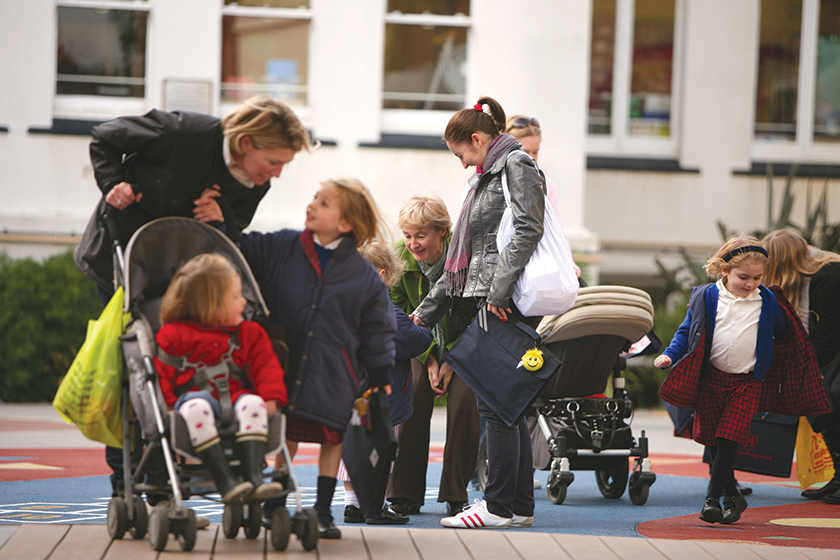Why Parents are Planning for Autumn Births
By
8 years ago
Do children perform better in school if they are born in the autumn?

Annabel Heseltine find that smart parents are planning for autumn births to fit with the academic school year.

It’s a fine thing when the date your baby is born on becomes a political and educational issue, but that is exactly what has happened because of concerns that babies born later in the academic year will be disadvantaged for life. The argument is that there is a considerable difference in maturity between a child of just four years old and a child rising five. Both are required to start school at the same time, in the academic year after their fourth birthday, and the younger ones will grow up believing they are less able than their older classmates. But that, in fact, has less to do with intellectual and physical talents and far more to do with their maturity, or lack of it, when they start school.
My children were classic late developers. Not long after my phone call, research was released in 2009 by the research body Cambridge Assessment, which confirmed my less than scientific suspicions. A child born in the earlier part of the academic year, between September and November, is likely to be physically, intellectually and emotionally more mature than his or her summer born peers, giving them an advantage at school. This phenomenon can persist at all stages throughout an academic career and into adulthood, they claim.
What the statistics say
- The actual maturity disparity, ‘the birthdate effect’, is most marked at primary school, and continually decreases through key stage (KS) 3 and 4 and at A-level.
- Research by the Institute of Fiscal Studies found that the disadvantage for August-born children over those born in September in expected attainment levels dropped from an average of 25 per cent at KS1 to 12 per cent at KS2 to six per cent at KS4 and one per cent at A-level.
- August-born students are 20 per cent less likely to attend Russell Group universities than their September-born peers. The Higher Education Funding Council concluded that ‘if all English children had the same chance of going to university as those born in September then there would typically be around 12,000 extra young entrants per cohort, increasing young participation by two percentage points’.
‘The statistics are compelling and shocking,’ says Tim Oates, group director of assessment research and development at Cambridge Assessment. ‘When you look at the qualifications, gender and date of birth, there is a very significantly pronounced effect. Many parents believe that it peters out as the children grow older but but this isn’t true. It is powerful and persistent.’
Oates believes it is a developmental effect. ‘We think there is a crucial spurt around four and a half, which enables children to monitor, plan and evaluate their work. Some rising fours just haven’t got there yet. They are not ready for school and are labelled as “less able”, which leads to a loss of confidence and negative associations, which will colour their educational background. There is evidence that these learned attitudes will persist for the rest of their life.’
Further studies
A newer study, published last year in the Journal of Child Psychology and Psychiatry by academics at Royal Holloway suggested summer-born children struggle at school entry because of unrealistic educational targets and a curriculum that is out of step with their developmental levels. The study concluded that babies born May to August are more at risk of behavioural problems and poor academic attainment in their first year at school and are more likely to have language difficulties.

This difficult start has long-term consequences. Malcolm Gladwell explains in his book Outliers. ‘Teachers confuse maturity with ability, placing older children in advanced streams where this prognosis soon becomes self-fulfilling as they receive more advanced teaching’. Economists, Dhuey and Bedard found that the youngest students were under-represented in US four-year college courses by 11.6 per cent.
‘The difference doesn’t go away,’ continues Gladwell, who believes that parents of pupils born at the end of the academic school year should consider holding them back a year. This is easier said than done, even in independent schools with more flexible entry requirements.
What the school heads say
Notting Hill Prep
Back in August 2004, I had looked at my own twins, born three weeks early, with a September due date but scheduled for a c-section birth in August for medical reasons. They had just turned two, were babyish, still needing a nap in the afternoon and I knew they were not yet ready for school. After much heart-searching – I was terrified of losing their places in the popular Acorn nursery school in Notting Hill Gate – I plucked up the courage to ring its then head, Jane Cameron, to ask if they could come a bit later.
To my relief, not only was she sympathetic but she agreed. ‘Usually, it’s the other way round. Parents can’t wait to get their children into school and I am the one suggesting they wait a few months.’ Cameron, who then went on to head Notting Hill Prep, stuck to her guns and still offers half days in reception to the parents of younger children. She also created an older ‘sapling’ year group at her nursery school, enabling summer born babies with a cut-off of March 1 to be taught in a nursery school environment for an additional year before transferring over to ‘big school’ in year one.

Westminster School
I first wrote about this issue in 2010 shortly after the 2009 Cambridge Assessment review was incorporated into the Rose enquiry of the primary curriculum. At the time I spoke to Dr Stephen Spurr, then headmaster of Westminster School, and asked him whether he allowed parents of summer born pupils to be flexible in choosing which school year they started in. He said he did not, explaining that, ‘We are aware of the phenomenon and are sensitive to it when considering younger boys for entrance, but boys with late birthdays here do just as well as anybody else if they fall into the top percentile bracket.’
He has a point. Westminster is one of the most academic schools in the country and perhaps his exceptionally bright pupils don’t experience this effect, at least not academically, although this doesn’t allow for disadvantages in physical or emotional maturity. Dr Spurr did however acknowledge the significance of the review. ‘Tim Oates has put his finger on something,’ he told me. ‘Competition is stiff – this is the real world. But this is an exciting developmental issue and it would be a real shame if we were missing out on potential. It would be a good outcome of this feature if there was more debate on the subject.’
Summer Born Campaign
And more debate there has been, as seven years on from the Rose enquiry, parents in the state system are still fighting for summer born babies to be able to start school later without being penalised. In 2013, Pauline Hull and Michelle Melson founded the Summer Born Campaign group. Both are mothers of summer born boys and didn’t want their boys starting school shortly after their fourth birthday, when legally they don’t have to start until the term after their fifth birthday.
There have since been changes to the school admissons code, but ambiguities remain and the Summer Born Campaign is still fighting for a fair and comprehensive ruling which allows summer born children to start school in reception when they are five instead of being forced to choose between either starting school in reception when they are barely four or missing a year’s education and starting in year one when they are five. ‘The school admissions code needs to be clear,’ says Hull. ‘That it is a parent’s legal right to enrol their summer born children in reception class at a compulsory school age (five), and that no child should be forced to miss a year of their education, at any point, following that decision.’
Independent school admissions
Fortunately, most independent schools are more flexible and parents can buck the system, especially if they are planning to send their child to an independent school outside London.
Not all London schools are rigid but, understandably, parents might be reluctant to narrow their children’s options at such a young age. ‘There is a difference in maturity between boys born earlier and later in the academic year,’ affirms Mark Snell, headmaster of Wetherby Pre-Prep, ‘but if they are going on to a prep school which won’t accept boys in the year below there is nothing I can do. It wouldn’t be fair as they have to jump a year.’

© Julian Andrews 2010.
Most of the research has tended to focus on the state sector, and many independent schools argue that by 12 or 13, age differences have evened out. Angus McPhail, Warden of Radley College, permits late August boys to start a year later but they have to have a good reason. However, says McPhail, many of the youngest boys do catch up and do very well with the right support, whether in sports, army scholarships, as headboys or going on to Cambridge.
Notwithstanding this, emboldened my experience with Notting Hill Prep, I continued to ask for both my twins to be educated a year below their academic year. Nine days outside their academic year they are not too old but neither are they bumping along behind the others. Indeed, their maturity and height has stood them in good stead. And it was a relief to discover that most schools are sensible to this need and don’t even question the request. That flexibility in itself justifies those school fees, if only the government could be more understanding in the state sector.
READ MORE: How to Manage the London Senior School Scene



